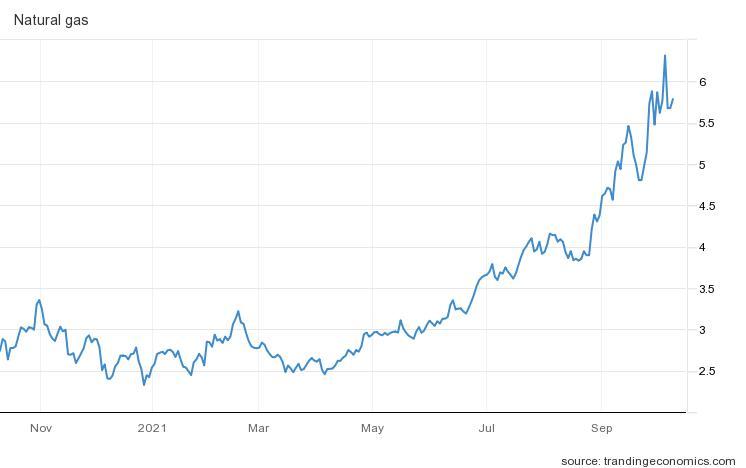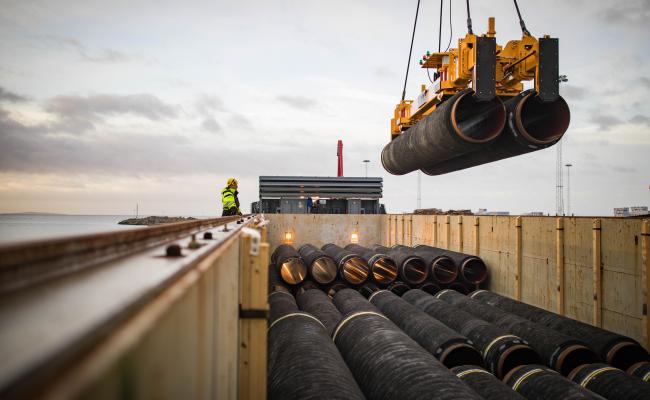How Were the Experts to Know that the Sun Would Shine and the Wind Would Quiet?

The price on Norwegian gas has skyrocketed since May this year. (Source: Trading Economics)
Commentary: Europe is freezing and Norway makes more money on gas exports than ever before. Russia is shutting its taps, while China puts new coal plants to work in order to face the energy crisis. I am talking – like everyone else – about the price on power. About an international market under pressure from “all” sides.
The explanation to the shock-like attack from power producers to consumers all over Europe and large parts of Asia could have been taken from the lyrics of a romantic tune. About a walk under the clear, dark sky after the wind has quieted down and the rain has stopped falling.
Not much romance
Because that is how meteorologists explain the electricity deficit. Lack of rain and wind.
Yet a game that is anything but romantic hides behind this explanation.
It is a story about how a country with a massive energy surplus, like Norway, sells gas at prices that were hard to imagine even just a few months ago. Last May, the price of a cubic meter of Norwegian gas cost NOK 2.70 (appr. € 0.27). Today, the price is NOK 13 (€1.30). those who are to tell us how much we as a nation make from the energy crisis gripping large parts of the world have to calculate fast – and frequently.
Perhaps the agrarian Center Party and the Labor Party also calculate national gas revenues during their currently ongoing government platform negotiations. The export of power will bring this rather expansive government minority coalition billions and billions of revenues, revenues that will be much needed when they are to deliver on their election campaign promises.
Norwegian government coalition negotiations
Yet the government negotiations are about limiting Norwegian power exports. About stopping construction of cables and terminating international agreements securing power exports and import. That is how the Center Party wants to secure Norwegian consumers. Or to put it differently; that is how we are to disregard the climate effect of exporting gas that may replace coal, in addition to giving up export revenues.
Revenues that will be much needed in the current government negotiations
Norwegian broadcaster NRK yesterday claimed that the EEA Agreement will form the basis for the new government coalition cooperation, despite the Center Party’s vocal opposition against this kind of agreements. That is, if true, good news. Though it remains to be seen what other international concessions the Labor Party has had to make if so.
However, the high power prices are not only a story about a Norwegian political game.
It is also a story about how energy politics influence international big politics. About how sanction politics and the big split between the East and the West has a direct effect on everyday Europeans’ wallets.
Russian big politics
On Thursday, the leader of the International Energy Agency (IEA) pointed out how Russia has the capacity to send significantly more gas to the European market and thus contribute to solving the European energy crisis.
It is, of course, not quite that simple. Russia has enough gas, in addition to every economic motive in the world, to sell gas to Europe at the current record-high price rates. Yet it also has political motives for demanding long-term gas agreements, in addition to faster access to the European market through Nord Stream 2.
Chinese shock waves
The latest news is a new pipeline for exporting gas from Russia to Europe, though one that – not least due to American pressure – lacks the final approval on the western side.
We were not even prepared for that
The high energy prices are also a story about a Chinese economy that has hit the wall and sends shock waves through the world’s stock exchanges.
And, lastly, it is also a story about how all the economic experts of the world have to settle for explaining in hindsight what hit us, rather than being ahead of events.
In addition to an illustration on how short we have come in our work to phase out fossil energy.
We were simply not prepared for the sun to shine and the wind to quiet down.
We were not even prepared for that.
Also read
This commentary was originally published in Norwegian and has been translated by HNN's Elisabeth Bergquist.



